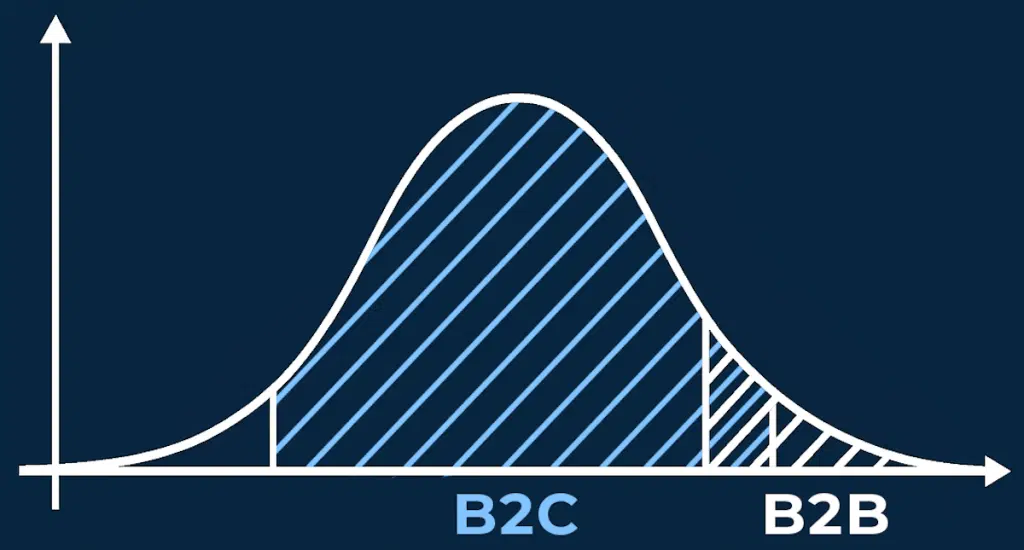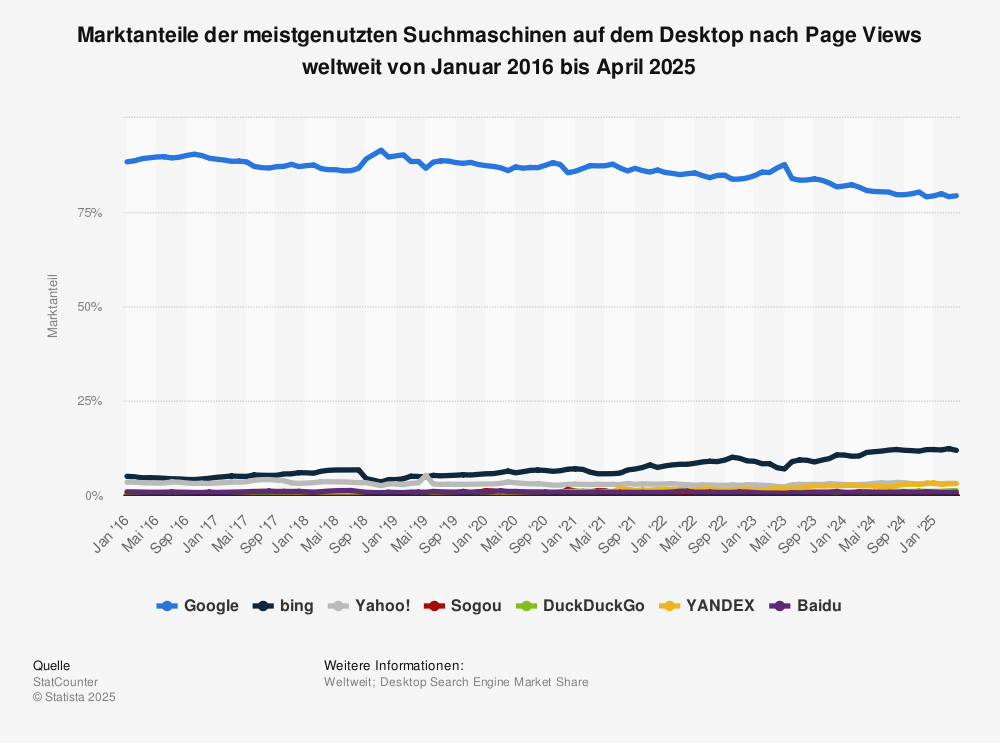Dr. Andreas Falke
7 reasons to switch your SEO agency
Important warning signs
Many CEOs are dissatisfied with their SEO agency. They are often uncertain. Am I just too impatient? Am I perhaps ending measures prematurely that would have achieved good results in the long term? We shed some light on this and discuss seven warning signs that there really is cause for concern.

Search engine optimisation from a business perspective

If implemented well, search engine optimisation can promote the growth of your company and reduce the costs of other marketing channels. However, SEO is a long-term strategy. It can easily take a year or more before the company starts to see relevant results. Most SEO agencies communicate this at the beginning of the collaboration. Unfortunately, the fact that you have to think long-term when it comes to SEO can also be used as an immunisation strategy. The agency then simply waits until something happens in terms of new customer sales and then pretends that this is the effect of the measures, even though it is often external factors such as seasonal or global economic changes that have an effect here.
It is often only after one or two years that a reliable decision can be made as to whether trust in an agency was justified and the SEO budget was well invested. To avoid agency hopping, in which smaller companies in particular move from one SEO agency to the next in disappointment, it takes more than trust. The following seven warning signs should help you to decide at an early stage whether you are in good hands with your current SEO agency.
Table of contents
The SEO agency ignores business goals
Warning sign 1
Marketing is a lackey of management. The marketing objectives must align with the objectives of corporate management, just like the metrics used. Especially those metrics on which measures are optimised. As a sub-discipline of marketing, this also applies to SEO.
The problem: Many of the metrics commonly used in SEO are not correlated with key management indicators. For example, neither SERP impressions (number of impressions in search results) nor click-through rates are usually particularly strongly correlated with the number of new customers or the volume of enquiries. This does not mean that they never are. It just means that more impressions or better click-through rates do not initially mean much. Unless it has already been established that they have an effect on new clients in a specific individual case. However, this can only be determined by comparing SEO metrics with the company’s key figures. If your SEO agency never asks for them, this is a bad sign.
Two important exceptions:
- Companies with an online shop can usually better understand how much enquiry volume is generated through which channel. However, very few B2B companies have an online shop. In this respect, this exception rarely applies to B2B.
- If a company already has reliable data on the average value of an enquiry via a specific channel, this data can serve as a basis for optimisation. But be careful! These values are rarely as reliable as companies believe. A regular review is advisable, especially if entire campaigns and strategies are built on the basis of this data. However, this data is rarely available to young companies and companies with a new website.
The SEO agency ignores the rest of your marketing
Warning sign 2
Effective marketing is holistic marketing. What happens on one marketing channel should either support the measures on other channels or complement them.
Let’s assume that the costs for an important keyword in a Google Ads campaign get out of hand. Then it may make sense to no longer target this keyword via Google Ads, but instead via an SEO measure, such as a new landing page that focuses on precisely that keyword. A good SEO strategy therefore takes into account the successes and challenges on other marketing channels.
Of course, this also works the other way round. It is often a good idea to include good SEO content in your social media marketing, for example by picking up on the topics of the landing pages with posts on LinkedIn, Facebook etc. and by linking to them. In this way, SEO not only helps with search engine rankings, but also with building credibility and with branding in general.
But this is only possible if your SEO agency is in the picture. If your SEO agency never or only rarely asks for information about your marketing in general, this is a bad sign.
The SEO agency does not contextualise metrics
Warning sign 3
Digital marketers love dashboards and metrics. For almost every metric, there is a scenario in which it is relevant. However, whether this is actually the case depends on the current strategy and objectives. Even relevant metrics need to be contextualised, however, as they rarely provide an accurate picture of the situation on their own. Neither the number of backlinks nor the keyword positions or the traffic via these keywords tell much of a story, except as part of a more comprehensive analysis.
Let’s assume a company wants to get 5% more new customers in the next 12 months. The SEO agency advises setting up a few landing pages that specifically target new keywords with good traffic. If the SERP results are diligently clicked on, the users seem to be interested. However, this does not mean that visitors to the landing pages have or will ever have the intention to buy. Even if the bounce rate is low and the scroll depth is high, there may not be a single potential new customer among the visitors. In B2B in particular, there is often a risk that content that private individuals find attractive will tend to put off professional buyers (see warning sign 6). So you need to look at whether people are making contact from the pages and whether enquiries are being made.
It is possible that these landing pages do not generate new customers directly, but indirectly. It is possible that good click-through rates and increased traffic encourage search engines to display more of the other pages through which visitors make contact. Many SEO measures are of this type. However, the SEO agency should prove the effectiveness of such indirect strategies. The often somewhat unimaginative monthly reports, often little more than an export from SEO tools such as Semrush or Sistrix with a bit of branding polish, are not always sufficient for this. Hands-on in-depth research is at least occasionally necessary. The results should then also be part of the monthly or quarterly meeting. If your SEO agency mostly discusses a few individual metrics without any further context, this is a bad sign.
The agency mostly considers SEO, but rarely your customers
Warning sign 4
At some point, all the typical SEO measures on the website and on the web have been completed. The time for quick wins is over. A proper content strategy is needed. The problem: Creating content that brings lots of visitors to a website is easy. It is much more difficult to create content that also generates new customers and sales. In B2B, some SEO agencies fail at precisely this point, simply because they lack good copywriters. But also because the content strategy is too focussed on the potential traffic of individual keywords.
The basic idea is quite plausible: the more potential customers you reach, the more likely it is that some of them will book. A wide reach is therefore desirable. So the agency identifies keywords that are used in search queries relating to your service or products. It then either enriches existing pages with these keywords or creates new landing pages for specific keyword clusters. Agencies often focus on three types of keywords:
- Keywords that express a clear intention or at least interest to buy,
- Relevant keywords with a high search volume, and
- Keywords that are easier to rank for, for example because the competition has overlooked or does not target them.
However, 1. and 2. are often not so easy to identify in B2B. Many keywords are used by job seekers, information seekers, and private customers as well as business customers. What may be attractive for private customers, however, often puts off professional buyers, engineers, etc. If the agency focuses too much on keywords metrics, it runs the risk of optimising content away from potential customers (see warning sign 6). If your SEO agency rarely or not at all differentiates between the interests of your business customers on the one hand and those of private customers and job seekers on the other, this is a bad sign.
In terms of content, you should pay attention if a copywriter inserts keywords at the expense of readability and style. A good SEO writer writes with the reader in mind and then optimises for search engines. A poor SEO writer writes for search engines first and then tries to make the text tolerable for readers. Keywords forced into headings, category errors, inconsistencies and incoherent passages as well as texts that lack relevant information so that they put off any expert are a clear warning sign.
The agency almost exclusively targets Google
Warning sign 5
Google has achieved what every marketer dreams of: in the minds of people, the brand is equated with the product category. Google is THE search engine. Even though Google has lost market share in the last ten years, around 80 per cent of all search queries in search engines are still made via Google. If you add Bing to this, it covers over 90 per cent of all search engine queries. With this in mind, it is not surprising that many SEO agencies focus primarily on Google.
However, market share only refers to searches via search engines. Searches via social media, YouTube, large language models such as ChatGPT, Amazon etc. are not included. The proportion of searches via such platforms has grown dramatically, though. In e-commerce, some of these platforms are now more important than Google.
Several billion search queries are made daily on YouTube alone. Whether searches via ChatGPT or YouTube are relevant for your company, or how important they are compared to Google, must be established on a case-by-case basis. What is certain, however, is that the search volume on many platforms is too large to categorically ignore. If your SEO agency does not address alternative platforms and optimisation options there at any point, this is a bad sign.
The SEO agency is optimising in the wrong direction
Warning sign 6
In may ways, B2B marketing is more demanding than B2C marketing. Many of the strategies that work well in consumer marketing are not available to B2B marketers. For example, those who offer services for companies often cannot quote fixed prices or use texts such as ‘only a few left’ to get them to decide and take action. Unlike private customers, professional buyers are subject to external rules and regulations, have more responsibility, and bear higher risks. They must constantly evaluate quality and quickly recognise empty promises and a lack of expertise. Engineers looking for a supplier do not want to spend a long time searching for relevant information or struggling through vague sales gobbledygook. B2B marketing must take this into account.
A wide reach is generally desirable. With this in mind, it is important to optimise texts for keywords that are used a lot. However, the reach must always be considered relative to the target group. This only partially overlaps in B2B with B2C, at least in terms of the relevant competencies and interests. This could be illustrated using a classic bell curve:

This is not about the Bell curve of human intelligence. Depending on the industry and situation, other characteristics and criteria are relevant for a purchase decision. That is why the X-axis is not labelled more precisely here. It could be about technical expertise, bullshit resistance and tolerance, etc. Of course, this is simplistic. A technology enthusiast may understand more about IT than a professional buyer, and many private customers also avoid advertising blah-blah.
The point: It is risky for B2B communication to resemble B2C communication too much. As long as it is unclear whether keywords with a wide reach really appeal to B2B target groups, you should not optimise for them too quickly. Otherwise, you may increasingly distance yourself from your actual target group. Style is a case in point.
In consumer marketing, it makes sense to avoid using technical terms and complex sentences. Simple messages are grasped more quickly. Complex communication thus reduces reach. Around 10 per cent of the German population have a reading disability; many do not speak German fluently. Maximum reach is achieved by using the highest common denominator: simple language. B2B marketing should not be unnecessarily complicated. But buyers, engineers etc. are often looking for more detailed information than the average end consumer. Expertise also sharpens the ability to differentiate. You can tell when texts have been written by people without specialist knowledge. Content in B2B must therefore also be technically convincing and should avoid cheap pop psychology, which is unfortunately very common in marketing. For reasonably intelligent people, psychological tricks are usually embarrassingly obvious, even if they are praised as clever in sales seminars. They may work in B2C, but less so in B2B. Who wants to hire someone who starts off with a cheap attempt at manipulation? Certainly not a good basis for productive collaboration.
If the SEO agency makes little effort to convey your company’s expertise with new content, this is a bad sign. There is a high risk that they will optimise for end users, but not for your potential customers. Ask for sample B2B texts at the start of your collaboration. Find out early on whether the SEO agency has suitable writers for your industry and target group. A good write for online shops rarely translates into a good writer for engineering texts.
The SEO agency promises the moon
Warning sign 7
Reputable SEO agencies are aware that the success of many measures depends largely on external factors. Seasonal or global economic changes, a weakening industry, but also changes in search engine algorithms and search habits as well as the SEO measures of competitors: none of these can be reliably predicted. However, they should always be taken into account when assessing the effectiveness of measures and should ideally be factored in (see warning sign 3).
For many companies, the number of relevant keywords is relatively small. At the same time, there are only a limited number of ‘winners’ for each search query. If you don’t make it into the top five SERP entries, you’re in a pretty bad position. Not only do the top 5 share around 70 per cent of all clicks, the click rates of the lower positions are deteriorating dramatically. This can become a problem for small companies in particular, especially if large players such as Amazon are involved in the industry or compete for the same keywords.
Because performance is generally unpredictable and it can be difficult to rank high in the SERPs due to the competition, promises in this regard are always empty. However, if an SEO agency promises that you will rank in the top positions on Google & Co. within a year with the keywords and websites relevant to your business goals, this is a bad sign. In some cases this is possible, even for small companies with a small SEO budget, but even where it is, it cannot be guaranteed.
Seek communication, not confrontation
Final remark
None of these warning signs in themselves are a reason to leave an SEO agency. It’s quite possible that your agency is doing an excellent job overall and only has a few small weaknesses. They may even have good reason to ignore or disregard some of the above points. If only one warning sign applies to your SEO agency, this is usually no cause for concern. However, it may be worth talking to your agency about this.
However, if this article reinforces an already existing negative gut feeling that something is off, feel free to consult Beyond the Blur for advice regarding your SEO measures to get some clarity and peace of mind. It is possible that even small adjustments to the strategy will be enough to get you back on track. So seek communication, not confrontation. This is usually more effective, more productive, and cheaper. But, let’s be honest, there are cases where switching to a new agency is the way to go. If that’s the case, we would recommend it.
